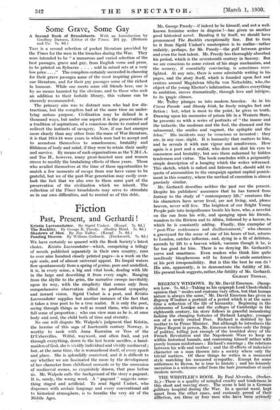Fiction
Past, Present, and Gerhardi !
Pending Heaven. By William Gerhardi. (Duckworth. 7s. 6d.) WE have certainly no quarrel with the Book Society's latest choice. Kristin Lavransdatter—which, comprising a trilogy of novels published separately in their own country, runs to over nine hundred closely printed pages—is a work on the epic scale, and of almost universal appeal. Its limpid waters flow spontaneously from ,a spring of genius, pure and undefiled, it is, in every sense, a big and vital book, dealing with life in the large and describing it from every angle. Ranging. from the idyllic to the grim, the narrative sweeps inevitably, upon its way, with the simplicity that comes only from comprehensive observation allied to profound sympathy, and inward vision. Sigrid Undset is a poet, and Kristin Lavransdatter supplies but another instance of the fact that it takes a true poet to be a true realist. It is only the poet, seeing through things as well as round them, who attains a full sense of proportion ; who can view man as he is, at once body and soul, the child both of time and eternity.
No one will dispute Mr. Walpole's judgment that Kristin, the heroine of this saga of fourteenth century Norway, is worthy to rank with Anna Karenina or Tess of the D'Urbervilles. Wilful, wayward, and often frail, and yet through everything, down to the last heroic sacrifice, a hand- maiden of God, she is vividly individual and vividly mediaeval ; but, at the same time, she is womanhood itself, of every epoch and place. She is splendidly conceived, and it is difficult to say 'whether we are fascinated the more by the development of her Character from childhood onwards or by the succession of mediaeval scenes, so exquisitely-drawn, -that pass before us. Mr. Walpole calls the background of the story a pageant. It is, surely, the wrong word. A " pageant " suggests some- thing staged and artificial. To read Sigrid Undset, who dispenses with archaic language and every conventional aid to historical atmosphere, is to breathe the very air of the
Middle Ages. .
Mr. George Preedy—if indeed he be himself, and not a well- known feminine writer in disguise !—has given us another good historical novel. Reading it by itself, we should have pronounced The Rocklitz exceptionally fine. But to turn to it from Sigrid Undset's masterpiece is to realize—rather unfairly, perhaps, for Mr. Preedy—the gulf between genius and even the best talent. Mr. Preedy has thoroughly absorbed his period, which is the seventeenth century in Saxony. But we are conscious to some extent of his stage mechanism, and the scenery, if essentially convincing, is sometimes over- lighted. At any rate, there is some admirable writing in his pages, and thejitory itself, which is tounded upon fact and centres around Magdalena Sibylla von Neitschiltz, -who,the object of the young Elector's infatuation, sacrifices everything to ambition, moves drainatically, through love and intrigue, to its tragic climax.
Mr. Tolley plunges us into modern America. As in his Circus Parade and Shanty Irish, he freely mingles fact and fiction ; but, what is most to the point, he gives us truth. Drawing upon his memories of prison life in a Western State, he presents us with a series of portraits of "the insane and the imbecile, the madman and the fool, the diseased and the subnormal, the seniles and vagrants the- epileptic and the felon." His incidents may be veracious or invented : they are, in any case, slight. It is humanity that matters to him, and he reveals it with rare vigour and sensitivenss. Here again. is a poet and a realist, who does not shut his eyes to coarseness and brutality, but sees them redeemed by hidden tenderness and virtue. The book concludes with a poignantly simple description of a hanging which. the writer witnessed. This sketch, which is naked and hideous fact, should add its quota of ammunition to the campaign against capital punish- ment in this country, where the method of execution is almost precisely similar.
Mr. Gerhardi describes neither the past nor the present. Despite his publishers' assurance that he has turned from fantasy to the study of " contemporary life," creatures like his characters have never lived, are not living, and, please heaven, never will live. The brightest of our Bright Young People pale into insignificance beside his hero, who, a novelist on the run from his wife, and sponging upon his friends, wanders to the Riviera and to Africa, followed_by a harem; to which' he is constantly adding. Finally, this .exemplar of " post-War restlessness and disillusionment," who chooses a graveyard for the scene of one of his hours of lust, returns to. London, catches influenza, and, dying in a fit of delirium, ascends by lift to a heaven which, vacuous though it be, is far too good for him. There is no denying Mr. Gerhardi's verve and smartness. Even readers who think him quite needlessly blasphemous will be forced to smile sometimes at his pert irresponsibility. But is this the best he can do ? His aim, apparently, is to demonstrate the futility of life.
His present book suggests, rather, the futility of Mr. Gerhardi.
GILBERT Tao :sus.
























































 Previous page
Previous page